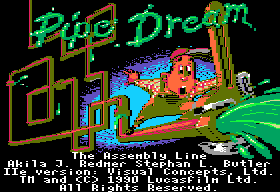Pipe Mania for Apple II
Apple IIPipe Dream
Game controls in browser
Show Controller & SystemClick on play Apple II game now button first to load the game and start emulator. Controls:
Pipe Mania
Online version of Pipe Mania for Apple II. Pipe Mania is a puzzle game developed in 1989 by The Assembly Line for the Amiga. It was ported to several other platforms by LucasFilm Games, who gave it the name Pipe Dream. Using a variety of pipe pieces presented randomly in a queue, the player must construct a path from the start piece for the onrushing sewer slime, which begins flowing after a time delay from the start of the round...
Game details
Other platforms online 6
You can play Pipe Mania online also in a versions for69%
rating (26 users voted)
Covers - Box Art
Apple II Computers
Online emulated version of Pipe Mania was originally developed for the Apple ][ (Apple //),
a family of home computers, one of the first highly successful mass-produced microcomputer products, designed primarily by Steve Wozniak,
manufactured by Apple Computer (now Apple Inc.), and launched in 1977 with the original Apple II.
The Apple II became one of several recognizable and successful computers during the 1980s and early 1990s, although this was mainly limited to the US.
Through 1988, a number of models were introduced, with the most popular, the Apple IIe, remaining relatively unchanged into the 1990s.
All the machines in the series, except the //c, shared similar overall design elements. The motherboard held eight expansion slots and an array of RAM sockets
that could hold up to 48 kilobytes. Over the course of the Apple II series' life, an enormous amount of first- and third-party hardware was made available to extend
the capabilities of the machine. The //c was designed as a compact, portable unit, not intended to be disassembled, and could not use most of the expansion hardware
sold for the other machines in the series.
All machines in the Apple II series had a built-in keyboard, with the exception of the IIgs which had a separate keyboard.
Apple IIs had color and high-resolution graphics modes, sound capabilities and a built-in BASIC programming language.




